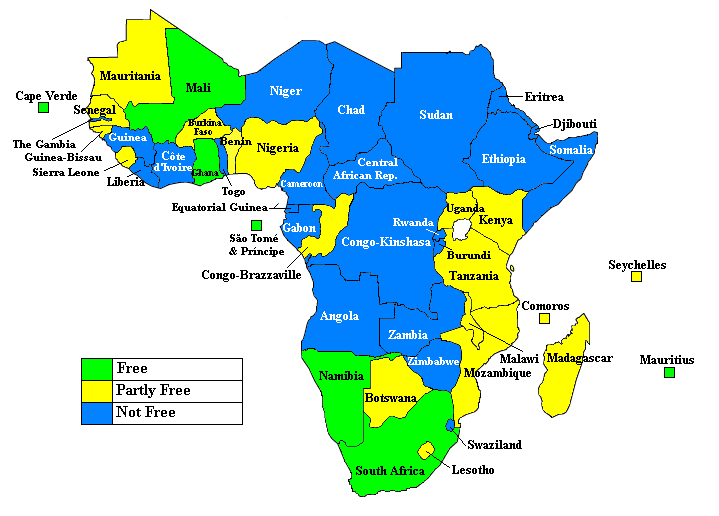Press Freedom in Africa
In essence, there can be no true democracy without a free press. By the same token, it can be argued that an unethical press poses a threat to democratic stability. Both journalists and governments have an obligation to work to protect media freedom and public access to information.
If African countries seek to strengthen democratic governance, they must work to provide an enabling environment where free, high-quality media can thrive. While all Afrobarometer website content is free for public use, we ask those using our data sets to register a user name, password, and email address. Long way to press freedom in Africa? Is media effective in its watchdog role?
Site lovingly created by Haba Haba. Access to data sets X. Close mobile search navigation Article navigation. Article PDF first page preview.
- Report Navigation.
- Media freedom in Africa 'not great'.
- Welcome to Africanews;
- Everything You Need To Know About The Security Clearance Process But Are Afraid To Ask!
- World Press Freedom Index 2017 finds democracies are clamping down.
- The Rohan Scripts;
You do not currently have access to this article. Add comment Close comment form modal. I agree to the terms and conditions.
Featured news and events
You must accept the terms and conditions. You have entered an invalid code. Thank you for submitting a comment on this article. Your comment will be reviewed and published at the journal's discretion. Please check for further notifications by email.

Despite the independent co-regulation reforms introduced by the PCSA, as well as lobbying by media rights groups, the ANC has not abandoned the idea of a state-run media appeals tribunal. However, Parliament had yet to initiate this process by the end of In March , the Film and Publications Board issued a draft set of regulations on internet content that attracted widespread public criticism.
- Bewerbungstraining: Anleitungen, Übungen, Vorlagen (German Edition).
- The Burying Place (Jonathan Stride Book 5).
- Fundamentals of Fluid Power Control.
- Press Freedom in Africa: A Cultural Analysis.
Among other restrictions, the regulations would require web users, including bloggers, who wish to distribute films, games, or certain publications to register with the board as an online distributor or face criminal penalties. In July , the PCSA negotiated the exemption of its members from the Film and Publication Board regulations in light of its expanded system of co-regulation that applies to online content.
Long way to press freedom in Africa?
A bill to implement the regulations was approved by the cabinet in August and submitted to Parliament in November The bill had yet to pass at the end of the year. While officially independent in its editorial policies, the SABC has come under fire for displaying a pro-ANC bias and practicing self-censorship. In recent years, a number of SABC programs have been canceled due to political considerations, and prepublication censorship of critical reporting on the ANC and Zuma has increased.
In November , the cabinet approved the draft Broadcasting Amendment Act, which aims primarily to reduce the number of nonexecutive members of the SABC board from 12 to nine, and to transfer the power to make recommendations for board appointments from Parliament to the communications minister, resulting in an increase in executive control. The bill had yet to win approval in Parliament by the end of In May , the SABC issued a directive to not broadcast visuals of violent protests on any of its news bulletins.
South Africa
The SABC argued that airing such visuals would publicize and promote violence. However, it is widely suspected that the decision was meant to limit negative publicity for the ANC ahead of the August local elections. Later in the month, however, Motsoeneng was given the position of SABC group executive for corporate affairs.
By the end of December, all board members had resigned; a report by the commission was expected to be presented to Parliament in early The overall objectivity of the news media is affected by the growing share of private outlets owned by government allies. For example, a number of key staff members have left the newspaper publisher Independent News and Media South Africa, claiming political interference after the company was acquired by the ANC-connected Sekunjalo Investments in A recent trend in politically motivated dismissals of editors of prominent news publications continued in Steven Motale, the editor of the Citizen , was fired in November after publishing investigations into alleged corruption by a former finance minister and reports critical of the current finance minister and ANC chief whip.
The World Press Freedom Index has just been released by Reporters Sans Frontières, and once again, the weak performance of African. It also provides yet another example of the diversity of the African continent. With respect to media freedom, Ghana and South Africa are far.
Journalists and editors working for private media organizations are free to publish content without any threat of official censorship. Citizens also obtain information from the numerous privately owned print, radio, and subscription television outlets.
- Supervisors Training Guide: The How-To Book for New and Experienced Supervisors
- Dependence and Autonomy in Old Age: An Ethical Framework for Long-term Care
- The Colors of Love and Autumn
- Filtered By Time
- Trade Policy Issues in Asian Development (Routledge Studies in the Growth Economies of Asia)
- How To Save A Marriage: 92 Tips On How To Solve Your Marriage Problems Without Needing Marriage Coun